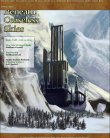Lois Tilton reviews Short Fiction, late January
I continue unenthused by the stories I’m finding this month. Even the most promising seem flawed in some way that keeps me from recommending them.
Publications Reviewed
- Beneath Ceaseless Skies #138-139, January 2014
- Tor.com, January 2014
- Strange Horizons, January 2014
- On Spec, Fall 2013

Beneath Ceaseless Skies #138-139, January 2014
Stories named “Enginesong” and “Evensong” this time. I don’t see the usual thematic connection between the stories in each issue.
#138
“The Year of Silent Birds” by Siobhan Carroll
The narrator is a revenant, summoned from her grave when the family is faced with ruin, its head and its heir accused of treason against the king. Lady Rehlite steps back into the old conspiracy that took her own life and her brother’s. Her mission seems futile.
The law says that a petitioner can wait to see the sovereign. But in the Year of Thorns, a clever High Steward had ruled that food and drink could not be brought into the petition halls. So most vigils do not last long.
This problem does not apply, however, to the dead.
Well-conceived dark fantasy, in which evil lies not in the dead but the ambitions of the living. The author teases us too long over Rehlite’s guilty secret, but my main problem with the story is that Rehlite goes to court to petition the king in her sister Fehle’s place, under Fehle’s name, because of the risk that Fehle could be caught up in the conspiracy and lose her own claim to the title, with no legitimate successor if her son is condemned. Yet this could certainly happen no matter who is speaking in her name. There are other advantages to having Rehlite be the one to go to court, such as competence, but that isn’t one.
“Enginesong” by Nathaniel Lee
A Tall Tale. It seems that one day the trains up and walked away from the town of Dead Mule.
“Just stood up and walked. Like they was waiting for the chance. Like they’d just decided something. They had feet like barrel lids and eyes like searchlights, but they never looked back.”
At first, Bose refuses to believe it, but he’s finally the first to volunteer for the posse sent out to hunt down the trains and bring them back [by what means, no one really knows]. Then he has second thoughts and a better idea.
This is a Neat Idea, and the narrative voice strikes the right notes. I could have done with rather less of Bose’s maundering backstory, but the conclusion makes up for it.
#139
“Evensong, Having Been Answered” by Dean Wells
Willem was once a musician in a group of friends, including the woman he loved rather unrequitedly. He then accepted a place with a more prestigious group and let his friends embark without him on a voyage to a new gig; their ship capsized; everyone died; and Willem slit his wrists out of guilt. Now, trapped in an eternal time loop, he revisits and revisits the scene of his betrayal.
Which is one thing. The setting is another, the author’s steampunky world that has been taken over by a new set of mechanical Gods who reign over Time; they, clearly, are behind Willem’s recycling. This setting and general plotline will be familiar to readers who have read the author’s previous story in this venue, although the outcome here is more positive.
Willem effectively represents the steampunk aspects of this strange milieu.
The “difference boy”, as he was known by very few, whose musical gifts and equations transcended his mortal heritage and drew upon the apotheosis itself; the transformation of flesh and spirit to mechanized immortality. Harmony elevated from numbers: the binary form of Lord Babbage’s numbered punch cards (the very precursor to Mechanical Thought) transformed into an opus of diatonic purity.
And as gods go, in matters of guilt and redemption, these steampunkish powers seem to be doing an effective job in their own way. What I can’t really fathom is why such entities should be concerning themselves in such matters. Also, the excessive Capitalization is irritating, an unnecessary flaw in the work.
“Sweetwater Notion and the Hallelujah Kid” by K C Ball
A skiffy alternate history when the moon has been colonized in the 19th century, with characters like Jack London, our narrator, residing there. Also the Kid, aka George Clayton Moore, who introduces Jack to Miss Sweetwater Notion on her return to lunar soil with a disagreeable husband with whom she now forms a trapeze act, scheduled to perform for the historic arrival of President Teddy Roosevelt on the moon. The Kid, alas, is still in love with her from the old days. But there are conspiracies afoot, and derring-do ensues, with great sacrifice.
I get stuck here on the notion that the Kid is someone else, not named George, but for this to be so, time would have be seriously out of joint. Otherwise, this is entertaining enough skiffy action stuff, sufficiently far removed from scientific plausibility to call it fantasy for the purposes of inclusion in this zine.
Tor.com, January 2014
Reading mostly the Wednesday stories.
“The Eighth Grade History Class Visits the Hebrew Home for the Aging” by Harry Turtledove
It’s evident that this will be a Holocaust story, in some way or another. And because of the author, we suspect an alternate history, in some way or another. But Turtledove isn’t in a great hurry to get there, because he has something more to tell us – about the vicissitudes of extreme old age, which we witness from the moment Anne Berkowitz wakes in the morning and reaches for the valve of her oxygen tank. As the story makes clear, however, there are worse things than old age. And as old age goes, Anne is more fortunate than some; she has her family around her, she has her mind and her memory. It is her memories that the visiting students have come to hear.
This is primarily a character study, and Anne is a particularly strong character – but then, she always was. Some readers may grasp the AH divergence more quickly, but it becomes quite clear once Anne begins talking to the students
“Nighttime in Caeli-Amur” by Rjurik Davidson
In this fantasy city, oppressively class-conscious, Irkin is weary of the rat race, which includes the outwardly comfortable marriage that keeps him trapped in it, slaved to appearances. He wants out, is too cowardly to go through with it.
The boys aren’t looking at me, either. Their little downturned faces are unmoved, as if it doesn’t matter whether I leave or not. I understand, though, that this is an act. They don’t want to show that they’re upset.
Instead, he escapes his home at night to roam the Forum, a dangerous place after dark, where he has become obsessed by the spectre of a shaking man, whose enigmatic pronouncements frighten him.
A dark fantasy with more than a small resemblance to the world of Mad Men or its predecessor The Man in the Gray Flannel Suit, to which it could easily be translated. The fantastic elements are really only scenery. We are left unsure whether to have sympathy or contempt for Irkin, a weak and unhappy man.
“The Cartography of Sudden Death” by Charlie Jane Anders
Ythna was chosen when very young to serve the Beldame Thakrra as one of her thousand retainers, a position she filled happily until the day her mistress suddenly died, at which point a strange red-haired woman mysteriously appeared from a door that hadn’t been there before. This turns out to be Jemima Brookwater, a time traveler, who tells Ythna that the unexpected deaths of important people can open such doors. Because retainers whose mistresses have died do not have a happy fate, Jemima offers to help Ythna, who only wants to mourn, but the interference of suspicious officials gives her no choice, and she unwillingly follows Jemima.
“So you really are a ghost,” Ythna said. “You belong to no one, you travel through death, and you come and go without being seen. I feel sorry for you.”
The premise here verges on the absurd, but the charm of the story is Ythna, a person of high character and admirable loyalty.
Strange Horizons, January 2014
I’m seeing a theme of the harm done by intrusive publicity, at least the first two stories this month.
“The Serial Killer’s Astronaut Daughter” by Damien Angelica Walters
While working on a space station, the nameless daughter finds herself the unwilling subject of relentless media attention. “I don’t know who the hell she is, but she isn’t me.” All she wants is to do her job and be left alone, but that is no longer possible and the publicity is too distracting. The thing is, she never knew who her father was until an intrusive reporter dug up the connection.
Here’s the skinny: my mother dated my father. Briefly. They never broke up, he just vanished. She found out she was pregnant, and, obviously, decided to keep me. Ten years later, he got caught.
A intriguing situation. The father is clearly a psychopath, finding a way to victimize one last person, the reporter is a conscienceless enabler, the real villain of the piece [a heavy-handed portrayal]. Together, for their own reasons, they are trying to ruin the daughter’s life and career. The space station bosses want her to keep quiet to avoid negative publicity. The daughter is conflicted – what should she do that’s best for her?
A feminist work – about which I have misgivings. The workers on the station are constantly referencing female space heroes like Ripley as role models for the nameless daughter. And between the daughter and the female commander, there is a consensus that males get away with this kind of negative publicity when women don’t. I’m not sure that applies in this case. What if the serial killer’s secret child has been a man? I suspect he would be the subject of even more distrust than a woman. After all, serial killers are almost always men. A son would probably resemble his father more closely than a daughter, and the media would be likely to press such a resemblance. On the other hand, it does seem that the killer is victimizing his daughter as a way of harming one final woman, who are his preferred victims. I think the strength of this piece lies more in seeing how this person deals with a devastating personal crisis than generalizing it into an ideological issue.
Someone should make a definitive list of stories employing this title formula, which is going to become overused.
“The Innocence of a Place” by Margaret Ronald
A subtly disturbing work of horror in the mode of inexplicable events. In 1911, the river at East Braxton went over its banks and flooded a school for young girls who then took refuge on higher ground at the house of a neighbor. At some point during the flood, they all disappeared: girls, teachers and neighbor, leaving no trace. The sole witness, Florence Ibbotson, a teenage girl who recorded the events in her journal, reported that they all climbed down into a well across the river from the school; her account, however, has inexplicably been discounted.
Now the narrator, a historian [she tells us] is researching these events at East Braxton. Her account deals primarily with historiography, the way historians know history – a matter of some dispute between the narrator and her estranged partner.
Robbie believes every minor detail tells part of a greater story, while I see instead the stories people make up to justify what has happened. Even when, as with East Braxton, there is nothing that can justify it.
Nonetheless, the narrator gives credit to Ibbotson’s account. She comes to the conclusion that there was some compulsive presence or force within the well that called to the victims, even though there is no sign of such a presence now. Other than that, the events remain a mystery.
If the innocence of a child counts for nothing, surely the innocence of a place is similarly meaningless. I think maybe sometimes the inexplicable comes out of nowhere, regardless of how new or untouched that space is, regardless of intention or action or even belief. Sometimes there is no good reason for history.
A well-done work that is, at the end, psychological, as revealed through the narrator’s voice, which we increasingly recognize as unreliable. As she tells us herself, people make up stories to justify what has happened, to justify their own reactions to what has happened, to what still may be happening. I only wish the author had omitted the metaphorical parallel storyline about the narrator’s partner and their estrangement. I really weary of that device.
“Palimpsest” by Anders Åslund
They say that when neural reconstruction was new, they tested the technique on a single mind. One single mind was transferred to new bodies over and over again. In between each reconstruction, all its memories were wiped and new, artificial ones embedded in the neural network. They say that this one mind has visited at least thirty different bodies. They say, with fixated, important looks, that this neural nomad might still be alive.
It soon becomes clear that Nim may be this person, or one with a similar history. The author is coy and doesn’t say so directly, as indeed Nim doesn’t seem to have been informed. [The name may be a reference to Nim Chimpsky, suggesting that the narrator is viewed as an experimental animal. We don’t know if this was his original name.] Nim not only has lacunae in his memory, he has disturbing dreams that seem to be residue from past incarnations – thus the title, suggesting a parchment not entirely erased before reuse.
There’s a lack of focus here. The author spends too much time on the very standard-issue future dystopian setting, the privileged center of which, we may suppose, Nim entered as an experimental “volunteer”. I’m also not buying the idea of obtaining large numbers of bodies from the “wild” for mind transplant; feral humans would be likely to have diseases, deformities, and other physical flaws, making them unsuitable hosts for members of this society, who cringe at body hair. Another problem is that Nim succeeds in his quest far too easily, as if guided by the provident hand of the author.
On Spec, Fall 2013
I’ve recently found a decline in readability among some of the little zines in the field. I’m hoping that On Spec, now in its 94th issue, resists this trend. Here are six stories, both SF and fantasy. I find them, overall, well-written but resting on questionable premises.
“Last Stand at Catesby’s Books” by Andrew Bryant
One of the last bookstores arms for a last-ditch confrontation with book burners.
Robert Catesby sat in the Children’s section by the second floor window of his book shop and read Through the Looking Glass for the last time. A Lee-Enfield Mark III rifle leaned against the wall, near the window. It was a good rifle for the mid-range, and suited his mature eyesight.
The story turns some nice phrases. And the store is a charming place and utterly impractical, and its staff are dedicated if utterly impractical. The premise, however, is not credible. It’s one thing to say that libraries will be closed to cut costs and publishers will abandon print for lack of demand, but quite another to suppose that this will lead to book-burning mobs in the streets. [Movie studios are now abandoning film, and we see no mobs attacking film libraries.] More likely, paper books would probably become more collectible and thus valuable as they grow increasingly rare. Also more likely, Catesby’s would be forced to close for lack of income to pay its taxes, because nobody seems to buy the books.
“The Revenant Threat” by R Crowle Gray
Urban sorcery. Tristan is a student following in his father’s magical footsteps when his feckless buddy Darwin shows up one day bearing a curse obtained in a poker game. The technical details of the curse hold some interest, but that’s about all. The story has the sense of being part of a series.
“All’s Safe” by Joseph C Romano
In a post-apocalypse world, Gleason has entered a monastery to try to atone for his many sins. The monks have now sent him out in a snowstorm, with his two bonded bears for protection against the sort of people he used to be, to deliver some casks of whiskey and modified seeds to a [relatively] nearby village. All is definitely not safe.
While the piece is generally well-written, I was irritated by the repeated misuse of the term “novitiate” to mean “novice”. Where are the editors? I quite liked the concluding line, except that the author extended the text for several paragraphs past it. If not for the bonding magic used on the bears, I’d call this science fiction, and in fact it’s only my assumption that it’s magic, though there are suggestions in the text that it isn’t; if so, I’m not at all clear how it could work. Magic is the term we usually use when we can’t see how else something could work.
“Bounded in a Nutshell” by Mary A Turzillo
The downside of immortality. The population of Earth has been stabilized, so that a new child is born only when an elder dies, usually from boredom. This makes Jonathan not only the Last Boy on Earth but the only child, which isn’t much fun, largely owing to his nanny Mrs Tyrman, of whom everyone is afraid. Because he is known to be unhappy, he is given the National Portmanteau Theater, consisting of tiny shrunken actors on a miniature stage. The actors originally volunteered for this role, but they have since come to regret their situation, as the authorities keep them confined. A sympathetic Jonathan finds himself faced with a hard decision.
This turns out to be a fairly optimistic piece in the end, but it all rests on the premise of the setting, a dismal world dominated by the fear of anything new. We don’t really know why everyone is so terrified of the tyrannical and unreasonable Mrs Tyrman. Nor am I convinced that people would volunteer to spend eternity as toys.
“Green Child” by Amber E Scott
This seems to be our world reverted to an 18th century level of technology and afflicted by a fantasy blight called the Withering. Some people, called Green Children, are born with the innate power to combat this blight. Rill is a Green Child who comes upon a tract of land where the blight has already overcome a local Green. The magic here isn’t too interesting, and the story is rather mawkish. There are also too many capitalizations.
“Intentions” by Howie Erickson
Under a totalitarian government where the government controls all information, the FBI is searching for a small number of Intents – people with a psychic ability to alter reality.
“They Meditate until they are in this super state of communion with the universe, and then they let their intentions be known. They visualize the outcome and let the universe’s power do the rest.”
Most of the known Intents have already been rounded up and enrolled in the service of the government, or else “inhibited” with extreme prejudice. Zardot doesn’t intend to let that happen to him.
Overall depressing piece, as despite Zardot’s clever tactics, it’s by no means a certainty that he will survive for long, or succeed, single-minded, in bringing down the regime.





